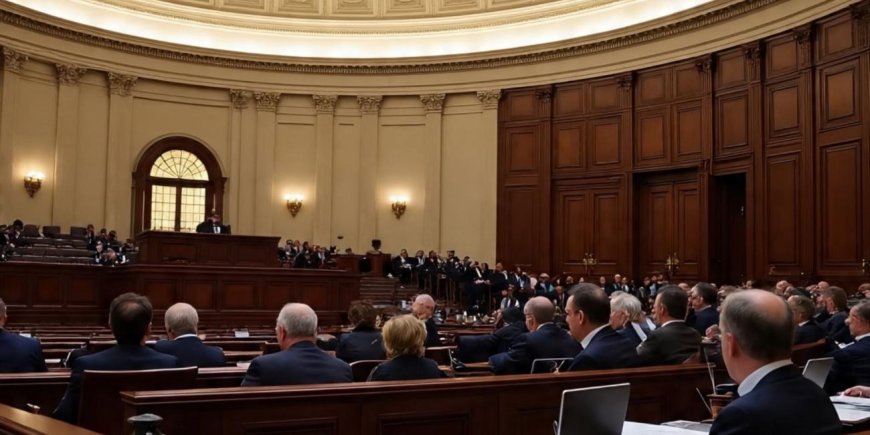US lawmakers move to sanction Nigerian officials over religious persecution claims

The United States House of Representatives has introduced a new bill seeking to hold Nigerian government officials accountable for alleged violations of religious freedom and human rights abuses in the country.
Titled the “Nigeria Religious Freedom Accountability Act of 2025,” the bill, sponsored by Republican lawmaker from Indiana’s 3rd District, Marlin Stutzman, was introduced on October 21, 2025.
According to details published on the official U.S. Congress website and seen online on Thursday, the bill has been referred to the House Committee on Foreign Affairs and the Committee on the Judiciary for further consideration.
Both committees will review the bill, filed as H.R.5808 in the 119th Congress, within their respective jurisdictions before it proceeds to the floor of the House.
In Section 2(a) of the bill, lawmakers outlined the primary objective of the proposed law, saying, “The President shall impose the sanctions described in Executive Order 13818 (50 U.S.C. 1701 note; relating to blocking the property of persons involved in serious human rights abuse or corruption) on the persons identified in the report required under subsection (b).”
Under Subsection (b)(1), the bill mandates that within 90 days of enactment, and annually thereafter, the U.S. Secretary of State must submit to Congress a detailed report listing Nigerian officials implicated in promoting or tolerating religious persecution.
The report will specifically target, “Federal officials or state governors who have, during the period specified in paragraph, promoted, enacted, or maintained Nigerian blasphemy laws, including through public advocacy, legislative action, or executive enforcement directives; or tolerated violence by non-state actors invoking religious justifications to commit acts of violence, including persons designated as foreign terrorist organisations… or specially designated global terrorists pursuant to Executive Order 13224.”
The proposed law also extends to “Judges, magistrates, prison officials, or other judicial or law enforcement authorities who have enforced blasphemy laws, including through prosecution, conviction, imprisonment, or other deprivation of liberty of individuals pursuant to such laws.”
The reporting period, as defined in the bill, covers 10 years preceding the enactment of the legislation and continues annually thereafter, ensuring that both past and ongoing violations are subject to scrutiny.
The bill also reinforces Nigeria’s recent redesignation as a “Country of Particular Concern” (CPC) under U.S. law—an action that subjects nations to potential sanctions for severe violations of religious freedom.
The text of the legislation read, “In reports required under Section 402(b)(1)(A) of the International Religious Freedom Act of 1998 (22 U.S.C. 6442(b)(1)(A)) and concurrent reviews required under section 301(a) of the Frank R. Wolf International Religious Freedom Act of 2016 (22 U.S.C. 6442a(a)), the Secretary of State shall designate, for engaging in or tolerating systematic, ongoing, and egregious violations of religious freedom: the Federal Republic of Nigeria as a Country of Particular Concern (CPC); and Boko Haram and ISIS-West Africa as Entities of Particular Concern (EPC).”
If passed, the bill would compel the U.S. government to impose sanctions on Nigerian officials and entities accused of enabling religious persecution or turning a blind eye to violence justified by religion, signalling a major escalation in Washington’s pressure on Nigeria over religious
Report that 12 northern governors, prominent traditional rulers, and senior judges are at the centre of a looming diplomatic storm as the United States Senate considers a bill that could impose far-reaching sanctions on them over alleged complicity in what American lawmakers describe as a “Christian genocide” and systemic persecution under Nigeria’s sharia and blasphemy laws.
The Nigeria Religious Freedom Accountability Act of 2025, sponsored by Republican Senator Ted Cruz, designates Nigeria as a “Country of Particular Concern” for religious persecution.
The bill proposes direct sanctions against public officials and religious authorities accused of promoting or tolerating violence against Christians and other religious minorities.
Under the bill, introduced on September 9, 2025, the US Secretary of State will, within 90 days of its passage, submit a report to Congress listing Nigerian officials, including governors, judges, and monarchs who have “promoted, enacted, or maintained blasphemy laws” or “tolerated violence by non-state actors invoking religious justification.”
Trump, in a post on Truth last Friday, designated Nigeria as a Country of Particular Concern and instructed the Secretary of State, Marco Rubio, to act without delay.
He lamented that thousands of Christians were being killed in Nigeria and asked Congressman Riley Moore, together with Chairman Tom Cole and the House Appropriations Committee, to immediately look into the matter and report back to him.
Also, a fresh US Congress bill recommended targeted sanctions and other restrictive measures on individuals and entities who lawmakers say are responsible for severe violations of religious freedom in Nigeria.
The bill named the Miyetti Allah Cattle Breeders Association of Nigeria and the Miyetti Allah Kautal Hore as erring entities.
Sanctions recommended on members of the groups include visa bans and asset freezes.
Member of the House of Representatives, Smith Christopher, introduced the bill on Tuesday while commending Trump for redesignating Nigeria a Country of Particular Concern.
In the bill, Christopher added that the US also places “Fulani-Ethnic Militias” operating in Benue and Plateau states on the Entities of Particular Concern list under the International Religious Freedom Act.

 admin
admin 


